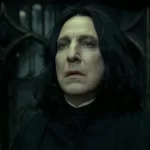But ask him and he will tell you he has played as many sweeties as sleazies. He’ll tell you about his good-guy roles in small films, far removed from the blockbusters.
By Steven Rea – Philadelphia Inquirer; Edited and republished as “Free Spirit” – Knight-Ridder News Service (5 Jun 1991); Via KelClancy’s Rickman Pages
It’s the Voice.
You’re phoning up from the hotel lobby – the Carlyle, that high-hatted bastion of Upper East Side affluence – to Alan Rickman’s room.
“Hello?” the Voice intones.
Whoa. This is a hello unlike any you’ve ever heard. Two puny syllables infused with a swirling conflation of emotion: seductive, disdainful, imperious – a growl as deep as the ocean, as commanding as Gen. Schwarzkopf on the front.
Hey, you think, getting a grip on yourself, it’s just a lousy hello. Upstairs, in the British actor’s $550-a-night, no-view suite, you realize why Rickman has, in a few short years, become the man Hollywood calls upon when it needs a bad guy. Not just any old bad guy, mind you, but a smart, sneering, look-down-your-nose-at-the-mindless-rabble kind of bad guy. The arch terrorist of Die Hard, the snide Australian of Quigley Down Under, and, come June 14, the dark, door-kicking Sheriff of Nottingham opposite Kevin Costner in Robin Hood: Prince of Thieves.
It’s not just the voice, you realize – it’s his look, his manner. Dry, ironic, honey-coated contemptuousness. Hawklike features. He’s the Basil Rathbone of the ’90s, and, alas, he’s already in danger of the typecasting that mired Rathbone (baddie Sir Guy of Gisbourne to Errol Flynn’s Robin Hood) in villainy for a score of Hollywood productions.
Rickman’s obviously aware of his precarious position. How else to explain his trip stateside to talk up his starring role in Truly, Madly, Deeply, the afterlife romance that opened Wednesday at the Ritz Five in Philadelphia?
In Anthony Minghella’s sugary first feature, Rickman is cast as a sensitive cellist who, dispatched to the beyond, returns to haunt his lover’s life. Juliet Stevenson (who appeared opposite Rickman in the London production of Les Liaisons Dangereuses) is the grief-stricken woman.
You suggest it must have been a nice change of pace, playing a sympathetic character for once. “Inevitably I get asked that,” he says with strained patience, “and it so isn’t what my experience is. It’s just that certain things that one does get more focus than others, but in actual fact if you look at the movies that I’ve made, it’s like three good guys to three bad guys – and one unnameable.”
Good guys: The January Man (a 1989 flop), Truly, Madly, Deeply (critics either love it or hate it) and Close My Eyes (a small English film, yet to be released). Bad guys: Already noted.
One unnameable: the fascist interrogator in the little-seen torture drama Closet Land.
“It’s just that the three bad guys I’ve done have been in big, Hollywood, expensive things, and the good guys are in small movies – small budgets at least,” he says. “It’s a definite mix to me, but not, obviously, in the public’s perception. They haven’t seen all those things – and didn’t, and won’t. But you move on, and you can qualify your own image, I suppose.”
But for the time being, the image lingers. And it should linger through the summer. It is said, from those who have seen bits of Robin Hood, that Rickman, as the necromantic lord of the shire, chews up the film sublimely.
“Yeah, why not?” he says of playing the villain. “It’s fun being naughty.”
Rickman, smiling, says he harbors no core of evil that might explain his charismatic sinisterness on the screen. His success in imparting such malevolence, he observes, can be traced to matters more mundane.
Like camera angles.
“If a camera is placed endlessly on the floor in all your shots, and looks up your nostrils – you know, it’s not just me. The director and the cinematographer are doing the job in spite of whatever I might be doing at the moment. I kept saying that to (director) Kevin Reynolds in Prince of Thieves: ‘Hallo, look where the camera is. Seen it down there before.’ ”
Rickman concedes that he does have “certain features, that if they’re lit from certain angles” take on a look of menace. “It’s out of story books, it’s out of The Wizard of Oz. Somebody with Debbie Reynolds’ features doesn’t get cast as the Wicked Witch, although maybe they should.” In Truly, Madly, Deeply, Rickman’s features assume, appropriately enough, a ghostly glow. The film, made for British television but blown up to 35mm, has been described as “the thinking person’s Ghost,” a notice the film’s U.S. distributor happily trumpets in its ads.
But there are those who think comparing Truly, Madly, Deeply to Ghost might scare off as many moviegoers as it attracts.
“It’s just sort of a strange world we describe when we think people are saying, ‘Well, I saw Ghost, I’m therefore not going to go to see this other movie.’ You know, ‘I saw Anna Karenina so I ain’t going to see Boris Godunov.’ It’s so different, and I hope that people tell each other that it is. Then they’ll go see why.”
Rickman’s scenes with Stevenson are particularly affecting. The two have worked together often – in Liaisons (Rickman the Vicomte, Stevenson Madame de Tourvel) and other Royal Shakespeare Company endeavors – and the actor remains in awe of his colleague. For Rickman, one scene in Truly, Madly, Deeply confirms Stevenson’s power. It comes early on, when her character, Nina, wracked by the loss of her loved one, breaks down and cries. And cries. And cries. And cries – tears and saliva and fluid oozing from every orifice on her face.
“That scene earns the movie,” Rickman observes. “I think you needed to have that scene to ground the film in reality, and for her to be as uncompromising as she is with it. Everybody gets a purging. It’s a bit like an emotional car wash that she gives you – and then you can get on with the movie, really. You’ve got to see her grief, and so Anthony (Minghella) really lets you see it, and so does Juliet.”
Rickman was born in London, where he still resides. (He shares a house near Portobello Road with a woman friend; it’s around the corner from the Prince of Thieves‘ Maid Marian, Mary Elizabeth Mastrantonio). Nonetheless, he calls himself a “full-blooded Celt” – his parents were Irish and Welsh. And “they certainly didn’t have anything to do with the theater. I’m some kind of accident.”
That accident occurred when Rickman was still in grade school. “I was 7, and I remember being given a part in a play and thinking this is exciting. A good escape.”
Art school and five years as a partner in a Soho graphics studio got in the way, however, and it wasn’t until his mid-20s that Rickman turned to acting as a profession. He is in his early 40s now, although he won’t supply exact digits. (“Yes, I do mind,” he responds to a query about his age.) An audition at the Royal Academy of Dramatic Art led to his appointment to the Royal Shakespeare Company, where he essayed a gamut of roles. His portrait of the seductive, sinister Vicomte in Liaisons (John Malkovich landed the role in the film adaptation) won him accolades both in London and on Broadway (where he received a Tony nomination).
Rickman has also done a considerable amount of television work in England, including Barchester Chronicles, seen here on Masterpiece Theater.
After the 12th-century spectacle of Robin Hood: Prince of Thieves, the actor will be seen in the aforementioned Close My Eyes, which had its premiere at the Berlin Film Festival in February. The film is slated for fall release.
“It’s another love story,” he reports, in deep, sleepy tones. “I’m part of a triangle. It’s me, my wife and her brother. I discover a little later – rather a lot later than the audience does – that she’s having an affair with her brother.”
Alan Rickman, victim, not villain. Hollywood, please take note.



